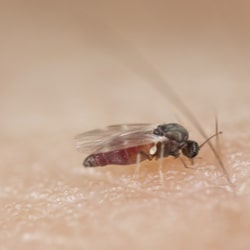Identification
- Colour Black, yellow, or orange
- Size From 2 mm to 6 mm long
- Also known as Turkey gnats, Buffalo gnats
- Description Typically have large wings, an arched thorax, large eyes, and short antennae

How to identify Black flies
With more than 160 species present in Canada, black flies are especially annoying pests. To make their prevalence worse, several species are known for biting people and sucking their blood, like mosquitoes. Black flies range in size from 2 to 6 mm and typically have large wings, an arched thorax, large eyes, and short antennae. Most species have a black body, although some are yellow or even orange.
Black flies Removal
Most black fly remedies are aimed at eradicating larvae by larvaciding breeding sites, as adults can be difficult to control. To protect against being bitten or ending up with a mouthful of flies, it’s best to avoid peak periods of black fly activity during daytime hours in May and June. They are particularly fond of hot, humid days. When outside in infested areas, use appropriately labeled insect repellent, wear protective clothing, and consider fine-mesh head netting, similar to those worn by beekeepers.
How to prevent Black flies from invading
Avoid black flies in the daytime in May and June. Be especially careful on long, hot, humid days. Use appropriately labelled insect repellent. Wear protective clothing and fine mesh head netting.
Habitat, Diet, and Life Cycle
Habitat
Females lay their eggs on partially submerged objects in fast flowing waters. They prefer running streams to those that are stagnant. Black fly larvae remain underwater after attaching themselves to a static object like a rock or branch and can remain there for several weeks. When development is complete and the adults finally surface, they immediately fly away but tend to stay within 16 km of their breeding source unless carried farther by air currents.
Diet
Black flies feed on flower nectar, though females also bite people for a blood meal needed for egg development. This is most common shortly before they lay eggs. Depending on the species, females will also feed on other mammals or birds. They will not venture indoors specifically searching for blood, making the black fly mainly an outdoor pest.
Commonly Asked Questions
Why do I have black flies?
Black flies rarely come indoors, preferring to stay outside, laying their eggs on partially submerged objects in fast flowing waters, like streams. The larvae that emerge stay underwater for several weeks, attaching themselves to a rock or branch.
Once the larvae are fully grown, they fly away but usually stay within 16 km of their birthplace, seeking out sources of their primary food, flower nectar.
How worried should I be about black flies?
Just before female black flies lay eggs, they will bite humans, mammals, or birds and suck their blood like mosquitoes to get a “blood meal” required for egg development. This does not transmit disease but can cause a small wound or severe swelling.
There also is so-called “black fly fever,” a collection of symptoms including headache, upset stomach, and fever. Meanwhile, non-biting black flies make pests of themselves by flying around people’s heads and crawling into their ears, eyes, nose, and mouth.
Adult flies can be difficult to control, so to truly eliminate a black fly infestation, you’ll need to focus on eradicating the larvae with the help of a professional pest control service.
Other pests related to Black flies
100% Satisfaction or Money Back Guarantee
Resolving your pest problem is our #1 priority. If re-treatment is required, we'll provide immediate services at no extra cost. If your expectations are not met, we guarantee a full refund of your service payment.
Remove pests from your home, and stop them from coming back
We work hard to listen, understand and assess your unique situation. Request a free, no-obligation estimate today for a customized pest program that fits your needs.
Request a Free Home EstimateRequest a Free Business Consultation

